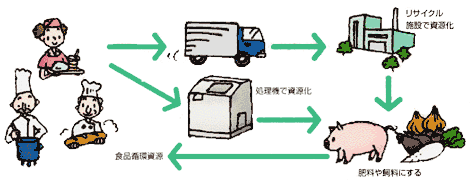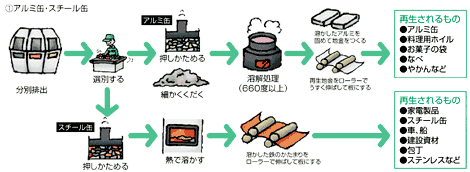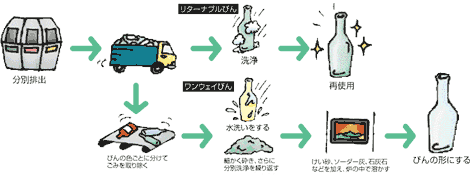- Yokohama-shi Top Page
- Business
- Menu by field
- Waste and recycling
- Business-related general waste
- Let's promote 3R dream recycling!
- Let's promote 3R dream recycling!
Here's the text.
Let's promote 3R dream recycling!
Last Updated April 1, 2023
Recycling of waste
Business waste includes valuable resources such as recycle paper, cans, bottles, plastic bottles, and food residues (kitchen garbage). Let's try to separate and discharge with a separate box and recycle it.
- Thoroughly separate and discharge, and request collection (recycling) to a resource recovery company.
- In some shopping streets and office districts, there are places where joint collection is made on a fixed date and time. As the amount is collected, it is easier for the collection company to collect.
- There is also a method of requesting a dealer or product supplier to collect it, or bringing it together to a processing company or raw material wholesaler.
- Let's sort it by type as much as possible. By segregating it into small pieces, it becomes easier to recycle.
- There are some vendors that can be brought directly, so please contact us directly.
- As of December 1, 2003, recycle paper, which can be recycled, must be separated by type and recycled. It cannot be brought into an incineration plant.

Images showing the recycling of recycle paper
How to recycle confidential documents
- Bring it to the recycle paper wholesaler.
- Ask a company that owns a shredder-equipped vehicle.
- It is brought directly to a paper mill where dissolving treatment can be seen.
List of vendors in Yokohama City handling recycle paper (PDF: 157KB)
List of companies that can process confidential documents (PDF: 125KB)
1.Purpose and Purpose of the Food Recycling Law
- There is a strong need to promote the recycling of leftovers, unsold, and food waste generated in large quantities during the manufacturing process from the viewpoint of reducing waste and making effective use of resources.
- The Food Recycling Law requires food-related businesses to reduce the generation of food waste, to establish specific standards, and to recycle food waste. Furthermore, it was established in 2000 with the aim of effectively utilizing it as feed and fertilizer, as well as controlling the generation of food waste.
What is food waste?
- Unsold food or leftover food
- Residues generated during manufacturing, processing, and cooking processes
What is food recycling resources?
- Useful food waste (waste and valuable materials) that can be used as raw materials for fertilizers, feeds, etc.
What is a food-related company?
- A person engaged in the manufacture, processing, wholesale or retail of food as a business
※For example, food manufacturers, department stores, supermarkets, etc. - A person who provides meals, such as restaurants, etc.
※For example, cafeterias, restaurants, hotels and inns, wedding halls, etc.
What is recycling?
- Control of outbreaks
Prevent the generation of food waste, etc. - Recycling
Use food recycling resources as raw materials for fuels and reduction agents, oils and fats, oils and fats, ethanol, and methane produced through feed, fertilizer, and carbonization processes. - Heat recovery
If the above recycling is difficult, convert it to heat or electricity obtained by incineration to recover energy equivalent to or higher than methane fermentation. - Weight loss
Decrease the amount of food waste, etc. through dehydration, drying, fermentation, and carbonization
2. Major contents of the revision of the Food Recycling Law in 2007
The Food Recycling Law was revised in June 2007 and came into effect in December 2007.
The main points of revision are as follows.
- Periodic reporting obligations
Food-related businesses that generate 100 tons or more of food waste per year must report the amount of food waste generated and the recycling of food recycling resources to the Minister of Agriculture, Forestry and Fisheries by the end of June every year. Must.
- Exceptions that do not require permission for the general waste collection and transportation business
In order to carry out recycling smoothly, it is necessary to take measures for wide-area recycling, but special provisions of the Waste Management Law have been established, such as eliminating the need for permission for the general waste collection and transportation business. .
Specifically,
(1) If you bring it to a registered recycling company, you do not need to permit the unloading place.
(2) Permission is not required within the scope of the recycling business plan (recycling loop) certification.
These are two points. - Set goals for recycling, etc.
Food-related businesses are required to have a recycling rate higher than the standard implementation rate for the year set for each food-related business operator. In addition, implementation rate targets for recycling and other activities have been set for each industry.
3. Toward reduction and recycling efforts
- Control outbreaks
Thoroughly manage ingredients so that you don't make too much food.
- Thoroughly drain the water
Most of the weight of food waste is water. By thoroughly draining, a considerable amount can be reduced.
- Recycle
Even so, let's recycle food waste that is generated. Specifically,
1. Ask a recycling company to process it.
2. Introduce kitchen garbage processing machines in-house
There is a way to do that.
Food recycling inquiries (food recycling facilities in Kanagawa Prefecture) (PDF: 71KB)
A list of registered recycling companies nationwide is posted on the Ministry of Agriculture, Forestry and Fisheries website (outside site)
- Use agricultural and livestock products made using recycled products
By using agricultural and livestock products produced using feed and fertilizers made from food waste, a recycling ring can be built for the first time. Actively use these products for stable recycling.

Image showing the recycling of kitchen garbage (food residue)
- We cannot carry in to Motoichi incineration plant. Please recycle as much as possible. In the case of disposalLicensed industrial wastePlease entrust and process it.
- There is also a way to have a vending machine installed or a beverage supplier pick it up. Aluminum cans and steel cans
(1) Aluminum cans and steel cans

Image showing the recycling of aluminum and steel cans
(2) Returnable bottles and one-way bottles

Image showing the flow of recycling of returnable bottles and one-way bottles
(3) PET bottles

Image showing the flow of PET bottle recycling
- Wood chips and wooden pallets for distribution of cargo generated in the construction industry, wood and wood products manufacturing industry, goods rental industry, etc. are industrial waste. We cannot carry in to Motoichi incineration plant.Licensed industrial wastePlease entrust it to and process it.
- Other wood waste is general waste. Please bring it to a facility that recycles it into raw materials for papermaking and recycle it as much as possible.
 Contact information for recycling wooden waste (PDF: 172KB)
Contact information for recycling wooden waste (PDF: 172KB)

Image showing the flow of recycling wood waste and wood pallets
- We cannot carry in to Motoichi incineration plant. Please recycle as much as possible. In case of disposalLicensed industrial wastePlease entrust and process it.
You may need a separate PDF reader to open a PDF file.
If you do not have it, you can download it free of charge from Adobe.
![]() To download Adobe Acrobat Reader DC
To download Adobe Acrobat Reader DC
Inquiries to this page
Resources and Waste Recycling Bureau Business Waste Management Section Weight Reduction Promotion Section
Telephone: 045-671-3818
Telephone: 045-671-3818
Fax: 045-663-0125
Email address: sj-haishutsu@city.yokohama.jp
Page ID: 307-152-233







